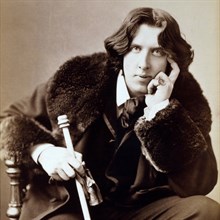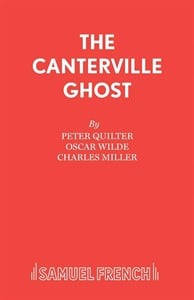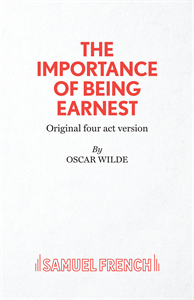Oscar Wilde

Oscar Wilde
Oscar Wilde (1854-1900) was born in Dublin to Sir William Wilde and his wife Jane. While studying at Oxford, he was fascinated by the aesthetic movement and eventually became a proponent for L'art pour l'art ("Art for Art's Sake") and wrote the award-winning poem "Ravenna." Upon graduating in 1879, he moved to London to review art, write poetry and lecture in the UK, the United States and Canada. In 1884, Mr. Wilde married Constance Lloyd and, in the course of their turbulent marriage, had two sons.
His first and only novel, The Picture of Dorian Gray, was published in 1891 and has been adapted for film and stage. Mr. Wilde's first successful theatrical endeavor, Lady Windermere's Fan, opened in 1892. He went on to create the wonderfully popular comedies A Woman of No Importance (1893), An Ideal Husband (1895), and the classic The Importance of Being Earnest (1895).
Not long afterward, Mr. Wilde was publicly accused of homosexuality and arrested for gross indecency. During his time in prison, he wrote De Profundis, a dramatic monologue and autobiography, which was addressed to his lover Bosie. Three years after his release in 1897, he died of cerebral meningitis in a rundown Paris hotel.
Known for his philosophical wit and irreverent charm, Mr. Wilde is famously quoted as saying, "Life is too important to be taken seriously."
Perform Oscar Wilde
View all-
The Canterville Ghost (Quilter)
Oscar Wilde, Peter Quilter
Full-Length Musical, Dramatic ComedyThe Canterville Ghost (Quilter)
Full-Length Musical, Dramatic Comedy / 2w, 2m, 6any gender (adult), 2any gender (youth)
A musical adaptation of the story by Oscar Wilde, The Canterville Ghost is a charming, funny and tuneful family show for all ages.
-
Lord Arthur Savile's Crime
Oscar Wilde, Constance Cox
Full-Length Play, MelodramaLord Arthur Savile's Crime
Oscar Wilde ,Constance Cox
Full-Length Play, Melodrama / 5w, 5m
This play is based on an 1890's story by Oscar Wilde about Lord Arthur Savile's who is engaged to lovely Sybil Merton. Her pet chiromantist Podgers has read Lord Arthur's palm and foretold he would commit a murder. Lord Arthur desires a blissful married life and therefore feels duty bound to get the…
-
The Importance of Being Earnest (Original 4 Act Version)
Oscar Wilde, Vyvyan Holland
Full-Length Play, ComedyThe Importance of Being Earnest (Original 4 Act Version)
Oscar Wilde ,Vyvyan Holland
Full-Length Play, Comedy / 4w, 8m
"The fun in the scene Wilde deleted is better than any living playwright can do." - James Agate
Originally written in four acts, this stage classic was cut when first produced to provide time the obligatory curtain raiser of that era. Acts II and III were condensed into one act and two characters were omitted from the last act.
Shop Oscar Wilde
View all-
The Canterville Ghost (Quilter)
Oscar Wilde, Peter Quilter
Full-Length Musical, Dramatic ComedyThe Canterville Ghost (Quilter)
Full-Length Musical, Dramatic Comedy / 2w, 2m, 6any gender (adult), 2any gender (youth)
Also available as: -
Lord Arthur Savile's Crime
Oscar Wilde, Constance Cox
Full-Length Play, MelodramaLord Arthur Savile's Crime
Oscar Wilde ,Constance Cox
Full-Length Play, Melodrama / 5w, 5m
-
The Importance of Being Earnest (Original 4 Act Version)
Oscar Wilde, Vyvyan Holland
Full-Length Play, ComedyThe Importance of Being Earnest (Original 4 Act Version)
Oscar Wilde ,Vyvyan Holland
Full-Length Play, Comedy / 4w, 8m
-
A Woman of No Importance
Oscar Wilde






